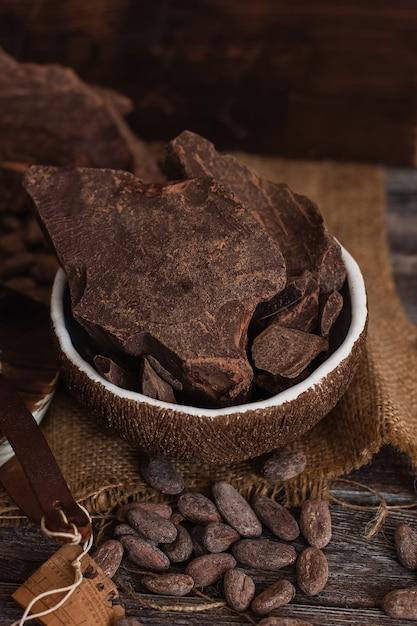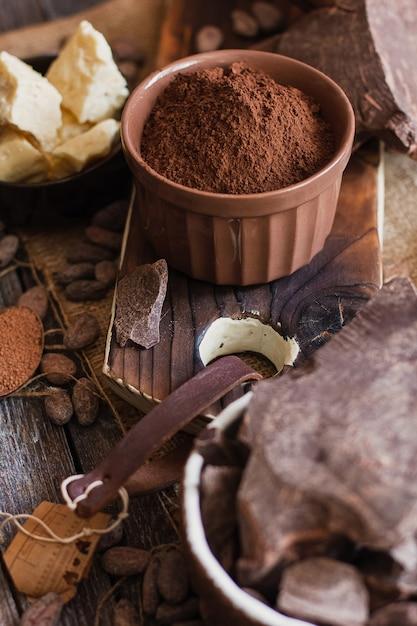If you’ve ever found yourself standing in the baking aisle, eyeing that intriguing block of unsweetened baking chocolate, you may have wondered if it’s safe to devour it straight from the package. After all, it looks just like regular chocolate, right? In this blog post, we’re diving deep into the world of unsweetened baking chocolate to answer all your burning questions.
But wait, why would you even consider eating unsweetened baking chocolate? Well, for starters, it’s often hailed as a versatile ingredient in the culinary world, lending its intense chocolate flavor to various recipes. Plus, if you’re watching your sugar intake or following a special diet, like keto or paleo, it could be a potential alternative to satisfy your chocolate cravings without the added sweetness.
So, before you unwrap that tempting square, let’s explore the ins and outs of unsweetened baking chocolate. From its safety for consumption to its shelf life, we’ll cover it all. So grab a cup of cocoa (sweetened or not, your choice!), and let’s journey into the world of unsweetened baking chocolate together.
Can You Indulge in Unsweetened Baking Chocolate
The Truth About Unsweetened Baking Chocolate
If you’ve ever found yourself with an unsweetened baking chocolate bar in hand, wondering whether it’s safe to satisfy your chocolate cravings, you’re not alone. The allure of rich, decadent chocolate can be hard to resist, even when it comes in a less conventional form. So, can you really eat unsweetened baking chocolate without regretting it later? Let’s dig into the truth, the myths, and the potential delights of this unsweetened treat.
Taking a Walk on the Bitter Side
Unsweetened baking chocolate, often referred to as “bitter chocolate” or “cooking chocolate,” is a fundamental ingredient in the world of culinary artistry. Its distinctive flavor profile — rich, intense, and yes, bitter — makes it an essential component in many delectable creations. However, it’s important to note that unsweetened baking chocolate is significantly different from the sweet milk chocolate or indulgent dark chocolate bars you’re used to munching on.
Caution: Not for the Faint of Heart (or Taste Buds!)
Before you dive headfirst into a bar of unsweetened baking chocolate, it’s crucial to understand that this type of chocolate is not designed to be eaten on its own. Unlike its sweet counterparts, which are specifically crafted to please the palate, unsweetened baking chocolate is made with a higher percentage of cocoa solids and absolutely no added sugar. As a result, it delivers a strong, bitter taste that might be overwhelming for those unaccustomed to its distinctive flavor.
Chocolate in its Purest (and Most Bitter) Form
Unsweetened baking chocolate is primarily used as a key ingredient in various recipes, where its deep, intense cocoa flavor can shine through. From rich chocolate cakes to silky ganache, this chocolate superstar plays a vital role in adding complexity and depth to countless culinary masterpieces. So while it may not be the go-to choice for a casual snack, unsweetened baking chocolate is the secret weapon that turns ordinary desserts into extraordinary ones.
Treat It Right: Pairs Made in Chocolate Heaven
If you’re determined to indulge in the world of unsweetened baking chocolate, fear not! By pairing it with other ingredients, you can create delightful treats that balance out the bitterness and showcase its true potential. Combining unsweetened baking chocolate with sweeteners like sugar or honey, or incorporating it into recipes featuring complementary flavors like vanilla or coffee, can lead to mouthwatering creations that will have you swooning with pleasure.
Conclusion: Proceed with Culinary Adventure
While unsweetened baking chocolate isn’t typically enjoyed in its raw form, it plays an invaluable role in the world of culinary delights. So, the next time you cross paths with a bar of unsweetened baking chocolate, don’t shy away from its bitter personality. Embrace the adventure, explore recipes that curate its deep flavor, and let your taste buds embark on a journey of intense enjoyment. Just remember to exercise caution when consuming unsweetened baking chocolate independently, as it may not be the sweet treat you’re accustomed to.
Frequently Asked Questions About Eating Unsweetened Baking Chocolate
What Are Some Good Alternatives to Chocolate
If you’re looking for alternatives to chocolate, fear not! There are plenty of options to satisfy your sweet tooth. Here are a few delectable substitutes:
- Carob: Made from the pods of a tropical tree, carob is often used as a chocolate substitute due to its naturally sweet flavor and similar consistency.
- Cacao Nibs: These are small pieces of roasted, shelled cacao beans. They offer a rich and slightly bitter taste, perfect for those seeking a less sweet alternative.
- Dark Chocolate: Opting for dark chocolate with a high percentage of cocoa solids can provide a more intense and less sugary experience.
Remember, each alternative has its unique characteristics, so don’t be afraid to experiment and find the one that suits your palate.
Can You Indulge in Unsweetened Baking Chocolate
Ah, the thrilling world of unsweetened baking chocolate! While it might not be your go-to snack, eating unsweetened baking chocolate is safe in moderation. Here are a few key things to consider:
- The Taste: Brace yourself for a rather bitter and intense flavor. Unsweetened baking chocolate contains no added sugar, so prepare for a taste that might make your taste buds stand at attention.
- Use in Recipes: Unsweetened baking chocolate is commonly used in baking as a key ingredient for rich, chocolatey desserts. When used in recipes, the bitterness is usually balanced by adding sweeteners or using it alongside other ingredients.
- Portion Size: It’s recommended to enjoy unsweetened baking chocolate in small portions. Savory as it may be to some, indulging in large quantities might overwhelm your taste buds and leave you longing for something a bit sweeter.
So, go ahead and embrace the intense experience of unsweetened baking chocolate, but remember to do so in moderation.
Should I Consume Chocolate Subsequently
Ah, the age-old question—should we devour chocolate with wild abandon or show some restraint? Here is some food for thought:
- Moderation is Key: While chocolate can be a heavenly treat, it’s best enjoyed in moderation. Too much of a good thing can lead to unwanted consequences, both on your taste buds and your waistline.
- Health Considerations: Chocolate, especially dark chocolate with a high cocoa content, can offer certain health benefits in small quantities. However, keep an eye on the sugar and fat content, as they can quickly add up.
- Listen to Your Body: Pay attention to how your body responds to chocolate consumption. If you find yourself unable to resist its siren call, it might be a sign to take a step back and reassess your chocolate consumption habits.
Remember, a little bit of indulgence every now and then can be delightful, but it’s essential to find a balance that works for you.
Is Chocolate Addiction a Real Thing
Chocolate addiction—it’s a temptation many have pondered. But how can you tell if you’ve crossed the threshold from enthusiast to aficionado? Here are a few signs to consider:
- Intense Cravings: Do you find yourself daydreaming about chocolate during the day? Constantly seeking your next fix? It might be a sign that chocolate has a hold on you.
- Emotional Attachment: Does chocolate become your emotional crutch during times of stress or sadness? If you rely heavily on chocolate for comfort, it could indicate an attachment that goes beyond mere enjoyment.
- Loss of Control: Are you unable to resist the allure of chocolate, even when you’ve made a conscious decision to cut back? If your willpower crumbles in the face of a chocolate bar, it might be time to evaluate your relationship with it.
While chocolate addiction is not officially recognized as a clinical disorder, it’s essential to be aware of your consumption habits and address any concerns that may arise.
Why is It Hard to Resist Sweets and Chocolate
Ah, the irresistible allure of sweets and chocolate! We’ve all been there, battling against the insatiable desire to devour one more treat. Here are a few reasons why it’s difficult to resist:
- The Blissful Flavor: Sweets and chocolate possess a magical ability to stimulate our taste buds, releasing a cascade of pleasurable sensations. The combination of sweetness, creaminess, and indulgence can be hard to resist.
- Emotional Comfort: Sweets and chocolate often provide us with a sense of comfort and satisfaction, momentarily alleviating stress or sadness. When we’re feeling down, they become a reliable friend, ready to lend a helping hand.
- Chemical Reactions: Our brains release dopamine when we consume sugar, promoting feelings of pleasure and reward. This chemical response can create a craving for more, contributing to the difficulty of resisting these temptations.
Remember, it’s entirely normal to be enticed by the allure of sweets and chocolate. The key is finding a balance and enjoying them in moderation.
How Long Does Baker’s Unsweetened Chocolate Last
Curious about the lifespan of your Baker’s unsweetened chocolate? Here’s the scoop on its longevity:
- Storage Conditions: To extend the shelf life of your unsweetened chocolate squares, ensure they are stored in a cool, dry place away from direct sunlight. Excessive heat or moisture can cause the chocolate to lose its integrity and taste.
- Best Before Date: Baker’s unsweetened chocolate typically comes with a “best before” date printed on the packaging. While the chocolate is often safe to consume after this date, the quality might deteriorate over time, affecting the flavor and texture.
- Approximate Timeframe: In general, when stored properly, unsweetened chocolate can last anywhere from 2 to 5 years. However, it’s ideal to use it within the first year to fully enjoy the distinct flavor and quality it offers.
Remember, always trust your senses when evaluating the quality of your unsweetened chocolate. If it smells off or develops a strange texture, it’s best to bid it farewell and seek a fresh, flavorful replacement.
Enjoy the world of unsweetened baking chocolate but remember to savor it in moderation, experiment with alternatives, and embrace the delightful dance between sweet, savory, and bitter. Happy indulgence!

